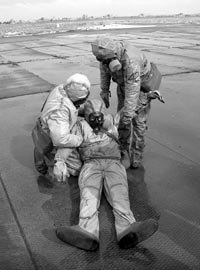Ukrainian battalion could be sent to the Persian Gulf in a couple of weeks... if parliament approves

Until recently, the very existence of the 19th Detached Radiological, Chemical, and Biological Defense Battalion of the Western Operative Command stationed in Sambir, Lviv oblast, was secret. Only last December did television channels air brief coverage of the special tactical exercises of a detachment at a military airport in Novy Kalyniv attended by Defense Minister Volodymyr Shkidchenko. And recently the whole world found out about it following the statement by Ukrainian National Security and Defense Council Secretary Yevhen Marchuk on the possible deployment of the 19th Battalion in the Persian Gulf region to protect civilians in case of a war with Iraq, should the latter resort to chemical or germ warfare.
As the detachment was deploying to train in military readiness exercises, First Deputy Commander of the Western Operative Command Lieutenant General Valery Frolov provided more detail on the battalion. According to him, it numbers 531 officers and men using 155 pieces of various equipment. Officers are armed with pistols and the men with submachine guns. The battalion has a specially trained platoon to prevent possible terrorist attacks on the battalion. Incidentally, we had a chance to see the latter in an exercise simulating a terrorist attack. Our soldiers acted in a coordinated and professional way. Lt. Gen. Frolov also stated that five men of the battalion had taken part in cleanup operations at the Chornobyl Nuclear Plant, 15% in armed conflicts, and 6% in peacekeeping operations including the one in Kosovo. The average age of soldiers is 28 years, with the oldest being 46 and the youngest 24. Service in the battalion is on an all-volunteer basis.
Many would undoubtedly like to know what missions this battalion can perform. According to Gen. Frolov, it has been trained to perform radiation and chemical reconnaissance missions; detect traces of biological weapons; collect and process information on radiation, chemical, and biological agents; conduct radiation monitoring; analyze and determine all types of poisonous substances; completely deactivate weapons, hardware, resources; and decontaminate an area, installations, and equipment. The battalion is equipped to independently carry out its missions for six straight months. “On the whole, the battalion is equipped with Soviet-type hardware, but it fully meets modern requirements,” adds the battalion commander, Lt. Col. Yuri Onyshchuk. “It is also equipped with hardware made in Ukraine. In addition, it uses a state-of-the-art local computer network that links all of its detachments, has an extensive database, and helps in making quick decisions.”
Should Verkhovna Rada approve employment of the Sambir battalion in the Persian Gulf and Middle East region, it will be able to begin its mission in couple of weeks. This time is needed to inoculate the military personnel who must develop immunity against most common diseases. In part, according to Yuri Onyshchuk, upon UN recommendation, troops to be deployed in the region will be vaccinated against typhoid, infectious hepatitis, tetanus, diphtheria, and yellow fever. He further stressed that all the required vaccines have been licensed in Ukraine and are available at the medical unit, four brigades of which conduct the inoculations, should Verkhovna Rada decide in favor of the deployment. The vaccination procedure will not exceed two days. Additionally, considering the possibility of germ warfare, the personnel will have to be inoculated against smallpox and anthrax, but vaccines against these diseases are not available in Ukraine. Thus the Americans have agreed to provide vaccines as soon as the decision to deploy has been made. Vaccination will be performed after all the required certificates have been provided by the vaccine manufacturers, and the Health Ministry of Ukraine has sanctioned its use. The soldiers’ pay will depend on the degree of involvement of the battalion. In particular, according to Gen. Frolov, in time of operational readiness on the territory of a foreign country they will receive between $600 and $1000 a month, depending on the rank and perhaps other factors.
Incidentally, even now they cannot complain about the amount of their compensation, as privates and corporals receive UAH 400 and up, while officers receive over UAH 800. As for the possibility of their deployment in a foreign country, the soldiers do not seem too worried about it. On the contrary, following months of strenuous daily exercises, the boys, to quote them, are looking forward to a change of scenery and new impressions. Thus the morale of the personnel appears to be quite high.
Newspaper output №: Section






